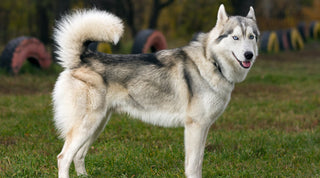Understanding the Siberian Husky
Siberian Huskies, originally bred by the Chukchi people as sled dogs, are known for their striking appearance and spirited temperament. With their thick fur, erect triangular ears, and distinctive markings, Huskies are easily recognizable. They are medium-sized, agile, and resilient dogs, capable of enduring harsh climates. This breed tends to be friendly, intelligent, and good-natured, making them popular pets around the world.
Proper Nutrition for Siberian Huskies
Feeding Regimen
For Siberian Huskies to thrive, they require a diet that is rich in protein and fat to support their high-energy levels. It's important to feed them high-quality dog food specifically formulated for active breeds. Portion control is crucial to prevent obesity; Huskies are known for their ability to regulate their food intake, but it's still important to keep an eye on their portions and not leave food available all day.
An easy way to ensure your Siberian Husky gets essential nutrients is by adding a scoop of Neo Bites Health Aid Meal Topper over your pup's existing meals. It's made from wholesome superfoods like kale, oats, turmeric, kelp and insect protein, and carefully formulated by a veterinarian—so you can rest assured they'll be getting the right amount of what they need.
Hydration
Hydration is equally important for maintaining a Husky's health. These dogs should always have access to clean, fresh water, particularly after exercise or in hot weather to prevent dehydration.
Exercise and Activity Level
Siberian Huskies are inherently active and require substantial exercise to maintain physical and mental well-being. Ideally, they need at least one to two hours of physical activity per day, which can include running, hiking, or playing in a secure area. Exercise is a key factor in preventing behavioral issues, such as digging or howling, which can stem from boredom or pent-up energy.
Coat and Skin Care
Grooming Requirements
The thick double coat of a Siberian Husky sheds year-round and requires regular brushing, at least once a week, to remove loose fur and distribute skin oils. During the shedding seasons in spring and fall, brushing may be needed daily to manage the increased hair loss.
Bathing
Bathing a Husky should be done sparingly, as their coat has natural oils that protect against the cold and should not be stripped by over-bathing. A few times a year is typically sufficient, or as needed if they become excessively dirty.
Health Considerations and Veterinary Care
Common Health Issues
The Siberian Husky is generally a healthy breed, but like all dogs, they can be prone to certain health problems. Some of the known issues include hip dysplasia, eye conditions like progressive retinal atrophy and cataracts, and skin conditions. Regular veterinary visits for check-ups and vaccinations are an essential part of preventing and managing these health concerns.
Preventative Measures
Preventative health actions such as flea, tick, and heartworm prevention are critical. Additionally, maintaining dental hygiene with regular tooth brushing or dental treats can fend off periodontal diseases, which are common in many breeds.
Mental Well-being and Socialization
Mental stimulation is as important as physical exercise for Siberian Huskies. These intelligent dogs need engaging activities that challenge them mentally, such as obedience training, agility courses, or interactive toys. Socialization should begin early, exposing a Husky to various people, animals, and situations to develop a well-rounded character. Positive reinforcement training methods work well for Siberian Huskies, who can be independent and wilful at times.
The Husky's Habitat
Siberian Huskies are adaptable to various living conditions but thrive in environments with plenty of space to roam and explore. Homes with securely fenced yards are ideal, but it is also possible for a Husky to live contentedly in an apartment setting provided they receive enough exercise. Due to their thick coats, they are more comfortable in cooler climates and may need access to air conditioning or shaded areas in warmer regions.
In conclusion, the health and wellness of Siberian Huskies are best maintained through a balanced diet, regular exercise, appropriate grooming, timely veterinary care, and mental engagement. By understanding the needs of this beautiful and energetic breed, owners can ensure their Siberian Huskies lead a happy, healthy, and fulfilling life.






